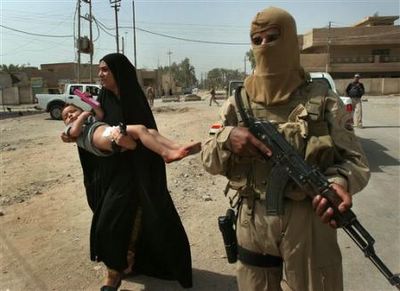Where´s a Christian anarchist when you need her?
London


Ye have heard that it hath been said: An eye for an eye, and a tooth for a tooth.
But I say unto you, That ye resist not evil, but whosoever shall smite thee on thy right cheek, turn to him the other also (Matt 5:39-40)
Iraq


Many years ago, I did military service for my country, learning among other things to shoot at a cardboard figure of a enemy soldier, aiming for the largest body mass of the human, dead centre in the chest. I knew he was the enemy on account of his vicious appearance, eyes squinting and rifle raised halfway to firing position. Strangely there was no fear depicted in him, just pure undefiled aggression, a machine out to get me.
The peace movement is a quite big thing nowadays, not least in the church. Of course war is still around, with no sign of improvement up ahead. But we may ask, is violence only a forbidden option when it comes to nations, or should we withhold moral rights from individual human beings we would gladly give to abstract organizations such as a nation state. It seems the agenda of the broader peace movement could be summarized as an application of the “law and order society” on the present anarchical state of international affairs. More United Nations, less United States of America. And who wouldn´t agree with such an agenda (at least outside republican America)?
The land is founded on law, as the old Swedish saying goes, and law ultimately in the barrel of the gun. That´s right, the smoothly efficient steel barrel of a gun. The bedrock of our society is a twofold principle, with one positive and one negative face. If we trust one another, we can relax and free up our trigger fingers for some productive work together. Abuse that trust, I´ll take up my gun and shoot you.
Let me say a few formal-sounding words, perhaps seldom in your mouth, seemingly far from the everyday world: Our society, political and economical institutions, criminal and civil law, i e our life form in this context is built on the state´s monopoly of violence. Then let me ask a question for which I´ve got no satisfying answer: Is a life in the likeness of Christ per definition one outside the law, as a stranger and outcast on this world?
On executions by lethal injection in the United States, there will in certain states be multiple executioners, only one of which will actually push the real button killing the condemned (the murder, the capital sin, actually being shared among a number of parties). Which points to a psychological mechanism found in religion as in life in general, that things disallowed as tangible acts, can be allowed when passed through a process of abstraction, so that a murder can take place without there being a murderer. In earthly justice, that is. Now I would not care to restrict the argument to capital punishment, especially since in my particular country none such is practised. Imprisonment and withdrawal of liberties is certainly also a form of violence, the difference being one of degrees, not in species. Do I mean to say that legal punishment is sinful and contrary to the will of God? I don´t know yet, for we must make very clear what our choices are; for if there be no choice, neither is there any sin. So let´s return to the subject briefly.
Looking at the initial biblical message, and how we relate to it, we discover an underlying ambivalence in ourselves. It sounds nice and kind, but is it possible? What Jesus says is at least perceived by his contemparies as radical, and if anyone today would venture to apply it in walk of life, or even worse, politically, what then? Well, an analysis of HOW Jesus expresses himself is crucial for our understanding of what he means. The passage quoted from the Sermon on the Mount is hard to place stilistically, the example given is concrete, but also obviously meant for a wider significance, aiming at universality but carefully avoiding any sense of abstraction. It goes beyond slapping, but it certainly includes that as well. The language is simple, yet hard to follow, which is usually a sign it costs a bit more than we´re willing to give. More than the church is willing to give anyway, for does not the church often pride itself in being a pillar of the community, a humanizing influence in our crass society, critical in details yet accepting the basic principles of law and order? Was the church ever asked of God to fulfil such a role?
The Sermon on the Mount begins with the so called Blessings, in which a rethorical figue is made, the meek shall inherit the earth, the poor in spirit (weak that is) shall receive the Kingdom, and those who are persecuted and suffer for Christ´s sake are indeed blessed by God. Heaven is the reverse image of Earth, where credit and debit will switch places. The blessings end with the encouragement to be the salt of the Earth, the antidote to the putrefaction and corruption we see around us. The salt signifies people who trust the blessings, who receive them gladly, actually receiving God in their lives, a presence over which the world has no dominion. As Mother Theresa said: “We can keep the joy of loving Jesus in our hearts, and share that joy with all we come in contact with.”
Let´s have a look at one of the most neglected and hid away messages in the Word of the Lord, a passage to be recited with great fear, on that the intonation be not amiss, the wrong word emphazised or the breathing pause mis-timed:
If any man come to me, and hate not his father, and mother, and wife, and children, and brethren, and sisters, yea, and his own life also, he cannot be my disciple.
And whosoever doth not bear his cross, and come after me, cannot be my disciple.
For which of you, intending to build a tower, sitteth not down first, and counteth the cost, whether he have sufficient to finish it. (Luke 14:26-28)
Observe the example given of constructing a tower, the Tower of Babel, a tower for protection, the watch tower in the garden to keep out trespassers. Also some may shout: Self contradiction! Whatever happened to loving your neighbour and all the other kindly stuff? Nothing much actually, it still holds, but as I see it this means to let go of all claims of ownership, on other people, on your own life. Is not this the first premise to be able to resist not evil? The only person left out of this “black list” is God, as if the only demand remaining possible and sanctioned is that of Jacob: I will not let thee go, except thou bless me. (Genesis 32:26)
So how to round this up? Call upon all believers to take it to the streets and crush ordered society? No, maybe just the opposite; don´t go running to society to crush the corruption of these filthy streets. As Jesus when put before the Roman judge did not dignify him with even a word, for his fate was in God´s hands, the real battle was an inwards one, and actually already won in the garden of Gethsemane. The City of God will NOT be founded by human hands, however willing or benevolent, no matter their degree of enlightenment. This means being in some sense lost to this world, in another sense free to act and react within it. There is no manual, no guru to show the way, just the Spirit of love and liberty given by God to all who will receive.
PS. One note of caution, the major difference between first century Palestine and twentyfirst century Western civilization is that they were all practically slaves, we are mostly rulers (at least of our own lives) in a democratic society. With power comes responsibility, as Spidey would have it (such a lousy authority to quote, and probably ripped off from somebody else!).

0 Comments:
Post a Comment
<< Home